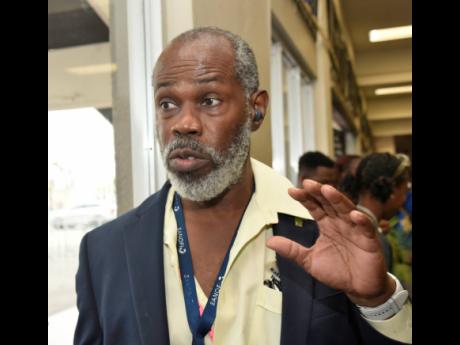UWI to increase enrolment of nurses, doctors
WESTERN BUREAU:
The University of the West Indies, Mona, is set to double its enrolment of nurses and increase its admission of medical doctors by 40 per cent. This significant expansion aims to address the critical shortage of healthcare workers in Jamaica.
The news comes as the university launches a pioneering global healthcare initiative, poised to revolutionise the sector in Jamaica and beyond. The initiative, situated within the University’s Knowledge Centre, aims to leverage higher education as a driver for economic growth and human capital development in healthcare.
Addressing human capital challenges being faced by the health sector here in Jamaica and the rest of the world, the university’s deputy principal, Professor Marvin Reid, told guests during a ceremony at the UWI Western Jamaica Campus (WJC) Tuesday evening, that the plan was, “to increase student intake in nursing, medicine, diagnostic imaging, pharmacy and dentistry by 40 to 150 per cent”.
At UWI’s WJC this would equate to an increase to 60 nurses, while at Mona, the numbers would move from 150 to 200 and medicine from 200 to 280, per annum, he told The Gleaner.
Emerging health corridor
Reid’s optimism was bolstered by the university’s principal, Dr Densil Williams, who views the west as an emerging health corridor, comprising regional hospitals, a new children hospital, and other healthcare facilities.
According to Williams, international students can hop off a plane at the nearby Sangster International Airport on a Monday, and board a flight back home on a Friday to spend the weekend with their family.
Of critical importance is that the initiative seeks to address the predicted global shortage of healthcare workers, estimated to reach 10 million by 2030.
The UWI Global Health Initiative is being developed and rolled out within the framework of the United Nations 2030 developmental agenda and the university’s own Triple A strategy, which relate to ‘Access, Alignment, and Agility’, added Reid.
“This strategy aims to prepare graduates to function in both international and local health systems, providing leadership and quality healthcare,” he explained.
He noted that the strategy is built on four pillars: maximising existing capacity for training health professionals and expanding their training footprint across Jamaica; developing new global health training products within the UN 2030 framework; increasing access and participation by students to develop skills and competences for leadership and quality healthcare.
In addition, it serves to create a platform to foster globally competitive and innovative research through local and international collaborations to address global health issues and contribute to the financial sustainability of the UWI, Mona campus and enhancing the Faculty of Medical Sciences.
That faculty provides training in basic medical sciences, diagnostic imaging, nursing, physical therapy, dentistry, medicine, and pharmacy to approximately 3,200 undergraduate students.
“In phase one, starting this academic year, the university plans to expand its numbers,” said the acting deputy principal.
“Training health professionals involves both classroom instruction and experiential clinical components. The expansion plans reflect UWI’s commitment to enhancing both aspects, ensuring comprehensive training for future healthcare providers.”
Proudly speaking of their expertise, he said the UWI is ranked in the top one per cent in Latin America and the top three per cent globally, and bringing its expertise in medical education to the forefront was a given.
The initiative also comes at a time when the government has committed $500 million annually over the next five years towards scholarships in over 26 disciplines in the healthcare profession.
“One of the challenges of barriers to accessing training in the health system has been student financing and the government has committed $2.5 billion,” argued the acting principal.
In the meantime, as the country grapples with its growing health challenges amid increasing migration, Health Minister made note of a letter of intent signed with the minister of health in the Philippines to collaborate on the training, recruitment, and clinical rotation of healthcare professionals.
The Philippines are one of the largest trainers of healthcare workers in the world.
“We have signed in Switzerland at the World Health Assembly. And we are sending a delegation there later this year. We are going to be collaborating on three fronts. One, we’re going to send some of our trainees there for clinical rotation, if we don’t have enough space here, starting with our specialist nurses.
“We are going to exchange faculty to increase the ratio of faculty to student. Faculty from the Philippines are willing to come here or utilise technology to increase the cadre. And thirdly, we’re going to recruit, hire Filipino workers, healthcare workers to come so that when we build our hospitals, we don’t have an issue as we do now,” he told the gathering.
A similar arrangement has been done with Cuba, which Jamaica has had long-standing bilateral arrangements with.
“We have over 300 Cubans in our system now, mostly nurses,” said Tufton.
An agreement was also signed with Nigeria three months ago, he shared, and there are discussions with India.
According to the health minister, he would prefer universities such as The UWI to lead these types of initiatives. He, however, cautioned that what the Government will not allow is for hospitals to be built that can’t be filled with workers.
For him, the UWI initiative is impatient of debate and the country has no choice but to embrace it as it is a matter of survival.

